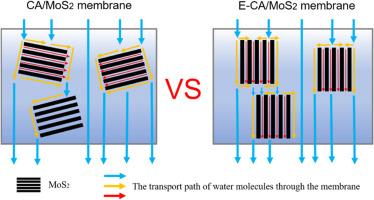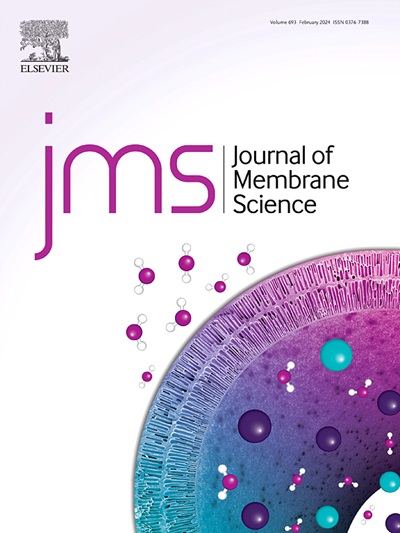Enhancing permeability of CA/MoS2 pervaporation membrane via electric field-induced orientation of MoS2 nanosheets
IF 8.4
1区 工程技术
Q1 ENGINEERING, CHEMICAL
引用次数: 0
Abstract
The formation of a mixed matrix membrane by incorporating nanofillers into a polymer matrix is a potential strategy to improve the separation performance of polymer membranes. However, agglomeration and random arrangement of nanofillers in the mixed matrix membrane result in lower permeation flux increase than expected. In this work, mixed matrix membranes composed of cellulose acetate polymer and varying amounts of Molybdenum disulfide (MoS2) nanosheets as nanofillers were prepared, and an electric field was applied to induce the alignment of MoS2 nanosheets in the membrane thickness direction. The effects of solution parameters including solvent type, MoS2 content, and polymer concentration as well as electric field parameters i.e., frequency, strength, and action time on MoS2 orientation were investigated using a stereoscopic microscope. The pervaporation desalination performance of mixed matrix membranes with randomly arranged MoS2 and orientally arranged MoS2 was assessed. At 2 wt% MoS2 content, the mixed matrix membrane with orientally arranged MoS2 exhibited a flux of 5.44 kg/(m2·h), representing a 25.9 % increase over the mixed matrix membrane with randomly arranged MoS2, while maintaining a salt rejection rate of over 99.9 %. The mixed matrix membrane demonstrated good long-term stability with consistent water flux and salt rejection during 120 h of operation.

通过电场诱导 MoS2 纳米片的取向提高 CA/MoS2 渗透膜的渗透性
在聚合物基质中加入纳米填料形成混合基质膜,是提高聚合物膜分离性能的一种潜在策略。然而,纳米填料在混合基质膜中的团聚和随机排列会导致渗透通量的增加低于预期。在这项工作中,制备了由醋酸纤维素聚合物和不同量的二硫化钼(MoS2)纳米片作为纳米填料组成的混合基质膜,并施加电场诱导 MoS2 纳米片在膜厚度方向上排列。使用立体显微镜研究了溶液参数(包括溶剂类型、MoS2 含量和聚合物浓度)以及电场参数(即频率、强度和作用时间)对 MoS2 取向的影响。评估了随机排列 MoS2 和定向排列 MoS2 的混合基质膜的渗透淡化性能。在 MoS2 含量为 2 wt% 时,定向排列 MoS2 的混合基质膜的通量为 5.44 kg/(m2-h),比随机排列 MoS2 的混合基质膜提高了 25.9%,同时保持了超过 99.9% 的盐排斥率。在 120 小时的运行过程中,混合基质膜表现出良好的长期稳定性,水通量和盐分去除率保持一致。
本文章由计算机程序翻译,如有差异,请以英文原文为准。
求助全文
约1分钟内获得全文
求助全文
来源期刊

Journal of Membrane Science
工程技术-高分子科学
CiteScore
17.10
自引率
17.90%
发文量
1031
审稿时长
2.5 months
期刊介绍:
The Journal of Membrane Science is a publication that focuses on membrane systems and is aimed at academic and industrial chemists, chemical engineers, materials scientists, and membranologists. It publishes original research and reviews on various aspects of membrane transport, membrane formation/structure, fouling, module/process design, and processes/applications. The journal primarily focuses on the structure, function, and performance of non-biological membranes but also includes papers that relate to biological membranes. The Journal of Membrane Science publishes Full Text Papers, State-of-the-Art Reviews, Letters to the Editor, and Perspectives.
 求助内容:
求助内容: 应助结果提醒方式:
应助结果提醒方式:


